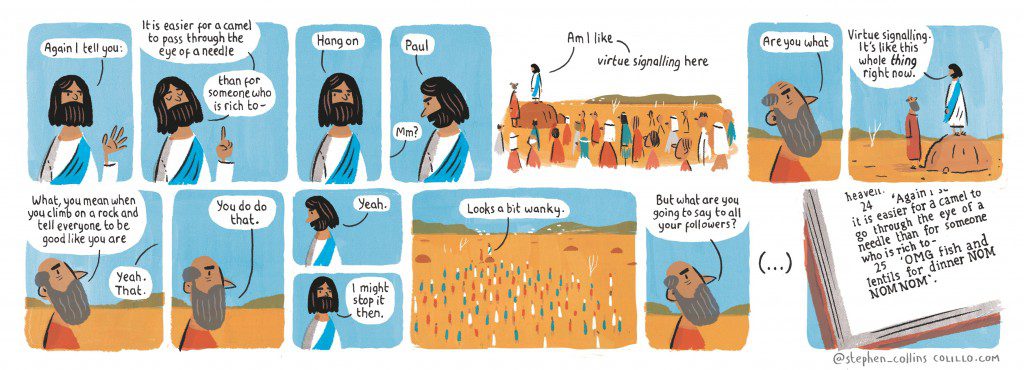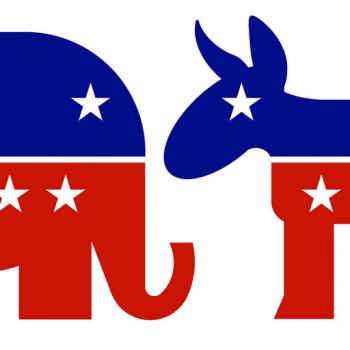Once one gets past the more basic kinds of name-calling – libtard, democrap, etc. – polarized political discourse online, when coming from the right and targeting the left, often settles on complaints about “identity politics” and “virtue signaling.” Should the aforementioned “libtard” get angry or upset about these terms or issues, especially if they happen to be rooted in personal experience, then the “libtard” magically transforms into a (special) “snowflake.” (The metaphysical basis of this trans-mogrification is unclear.)
I don’t intend to get into a deep analysis on this; I merely want to start a conversation. The best way of doing so seems to be to make some controversial claims. Before doing that, though, I’d like to try and get some kind of baseline definitions in place (Wiki will do to start with)… of course this may in fact be controversial in and of itself.
Identity politics
…refers to political positions based on the interests and perspectives of social groups with which people identify. Identity politics includes the ways in which people’s politics may be shaped by aspects of their identity through loosely correlated social organizations.
Virtue signaling
…is the conspicuous expression of moral values by an individual done primarily to enhance their standing within a social group.
Sorry, who?
What I find amusing about these claims from the right regarding the left’s engaging in these actions, is the complete failure to recognise that the right is the beneficiary of its own identity politics, and continues to engage in it now; likewise with virtue signaling.
Religious conservatives in particular have the template for identity politics in the Hebrew Bible. The Hebrew identity and its distinction from the Samaritans, the Canaanites, et al., and the Promised (home) Land, are about as clear a case of identity politics as there is. Beyond this, the story of Christianity (rather than Christ) is the story of a victorious identity politics – from minority, via martyrs, Muslims and mayhem, to majority. Since then everything from WASPs to the Tea Party have benefitted from identity politics. Indeed, dog whistle politics relies upon a common identity, and shared beliefs and language.
Identity politics is generally associated with a minority position. A common catch cry of (predominantly conservative) American Christians, is the claim of oppression – the annual ‘War on Christmas’ being a clear example of this (more on these snowflakes in a bit). These individuals are adopting minority status in order to engage in identity politics.
Of course, the claim about the entirely fictional war on Christmas, and the martyr-complex adopted by so many outspoken and much put upon Christians (patterned on the probably fictional, or at least greatly embellished, Christian martyrs) is a clear case of virtue signaling. So, indeed, is the never-ending parade of preachers who, on the one hand, extol Biblical family values (pro-life, pro-marriage, anti-gay), loud and long, whilst on the other hand engaging in some combination of adultery, divorce, ribaldry, and rentboys.
Then there are the conservative politicians who virtue signal like crazy during election season – from thanking God (which is now so formulaic as to be utterly meaningless), to promising to crackdown on “law and order” and “welfare abuse” (both being dog whistles for minorities, and especially African Americans). As with the hypocritical preachers, we find that the very politicians that demand drug testing of welfare recipients are themselves quite probably, and in some cases provably, using drugs themselves. In a similar vein, it is well known that the Southern States, the area that laps up the family values rhetoric, has the most abortions, and are the highest users of gay porn.
Costly signaling
Religion is the original virtue signaling: adopt some behaviour in the presence of your near community that seems costly, and therefore seems to be an honest display of piety, and then adopt some means of identifying oneself as being of that particular faith community (headwear and hairstyles being favourites). Having adopted the preferred symbol you broadcast your virtue to everyone with relatively little effort on your part to actually be virtuous. This is especially true in the modern world with dwindling church attendance and ideas such as “grace” requiring the utterance of a few magic words, once, to be permanently “saved” and self-righteous. As signaling goes, the lazy wearing of a crucifix pales against even modestly not-lazy signals, such as the fashion disaster that is the Hasidic payot, or the eschewing of (almost all) modern conveniences.
Religious virtue signaling is so much a part of American culture that it has become invisible to those that engage in it, and with that invisibility has come meaningless-ness. As such, to point out virtue signaling is not to notice bad or lazy behaviour, it is noticing an attempt to establish a political identity distinct from the (religiously based) cultural norm. In America publicizing ones atheism can indeed be costly. The laziness that is implied in terming someone’s behaviour as virtue signaling, ignores that the mere sharing of atheistic memes, or politically humanist or secular views, can lose one friends on Facebook, and that can (and does) equate to friends and family in real life.
Of course, in more highly liberal and less religious societies, such as the Scandinavian states, virtue signals like giving to charity are rarer. However, international aid from those governments, paid for by the taxpayers, tend to be higher, per capita, than more religious and less liberal societies. What if a government also listened to popular sentiment, as demonstrated by the sharing of news and views on social media (which these days virtually guarantees an op-ed or article in mainstream media), and acted in accordance with the wishes of the people, such that so-called virtue-signalling and “slactivism” actually had an impact?
Yes, what about that? What if citizens were free to get on with their days, secure in the knowledge that their politicians would actually represent them?
Projection
Just in case it wasn’t clear, I am saying that those on the right that claim that the left engage in identity politics and virtue signaling are very often projecting. Apart from anything, the use and abuse of stereotypes (African Americans, Mexicans, Muslims, people on welfare, homosexuals, transgender people) is weaponized identity politics, and very much a staple tactic of the right.
Psychological projection is a theory in psychology in which humans defend themselves against their own unconscious impulses or qualities (both positive and negative) by denying their existence in themselves while attributing them to others.
Does the left engage in projection? Of course, it is a panhuman foible as the above definition (also from Wiki) makes clear. However, I like to think that I (and many other liberals) make significant effort to notice it in myself (ourselves), and adjust accordingly. I see little to no sign of this on the right, as must be clear given that I’ve had to write a blogpost pointing this out.
Special Snowflake Syndrome
A definition, courtesy of UrbanDictionary:
A malady affecting a significant portion of the world’s population wherein the afflicted will demand special treatment, conduct themselves with a ludicrous, unfounded sense of entitlement, and generally make the lives of everyone around them that much more miserable.
The danger of this disease is that the sufferers rarely, if ever, know that they have contracted it, and continue about their merry way under the assumption that EVERYONE ELSE is the problem.
This condition, if left untreated, can radically alter the carrier’s demeanor, to include any of the following: a complete devolution to child-like behavior, temper tantrums, and/or fits of narcissistic rage.
Notice how, if we adopt even just the spirit of this definition (which we have to, because it’s rife with projection), it fails in what it is meant to achieve in the context in which it is most often used. For example, BLM are not demanding special treatment, in fact quite the opposite. The same is true for most minority movements. Equal treatment is not special treatment. Furthermore, demanding rights as part of a group is not special treatment as an individual, i.e. a “special snowflake,” by definition.
Notice that it is those that see their identity, which is derived in its entirety from the cultural norm, who are then forced to adopt an identity predicated on who they actually are (because they feel they can’t be American if “American” now includes blacks, Mexicans and Muslims) that are the ones that lose their minds and become special snowflakes.
And as for “a complete devolution to child-like behavior, temper tantrums, and/or fits of narcissistic rage”…
Let’s just say that there’s a reason that Trump was voted in by the same people that lose their minds when somebody says ‘Happy Holidays,’ and it’s the same reason that “Trump Twitter Tantrums” get’s 628,000 hits on Google. However, as Trump is now officially low-hanging fruit, let’s close with another special snowflake, who apparently can’t handle it when he doesn’t understand what a three-word colloquialism means:
















